#libyan actions
Note
I love your blog and I respect you a lot so please if it possible i want to ask you something. No one seems to care much for the fate of the egyptian protesters who were imprisoned yesterday and many of them were elderly. Egyptians prisons are a living nightmare where even medicine is denied and they live in crowded cells infested with mosquitos. Please we need to do somethimg this is horrifying they may die from lack of medical care and torture when all they did was protest for aid to enter Gaza.
Hi!
I can't find a method of how to help or where to direct people to donate! I assume it's because it's written in another language? I can't even see the page for the Egyptian Organization for Human Rights.
That said, here are some articles I found regarding all this so I can at least help spread some awareness.
Activists shared videos of one of the protesters chanting against business tycoon and government ally Ibrahim al-Organi, whose companies have been charging Palestinians thousands of dollars to exit Gaza.
The government of President Abdel Fattah el-Sisi has been criticised for failing to challenge Israel's siege on Gaza during the current conflict, and for allowing state-linked companies to profit from the movement of people and aid via the Rafah crossing.
The Rafah crossing in northeast Egypt is the only gateway for Gaza that is not directly controlled by Israel. But since 7 October it has opened only intermittently. Egypt blames Israel for the closure of the crossing, as Israel has imposed strict checks on all trucks entering Gaza via Rafah.
Following the protest, 10 activists were arrested at their homes and detained for 15 days on charges of spreading false information and joining a terrorist group, often a reference to the banned Muslim Brotherhood. Egypt declared the Brotherhood a terrorist organization in 2013, following the removal of President Mohammed Morsi from power. Since then, the government has cracked down on political dissent and banned protests, leading to the arrest of critics and activists who speak out against government policies.
During that trip, towards the prison near the Egyptian-Libyan border, detainees were scared and tired. Some of them had to urinate inside the car, using plastic bottles they had, after they were denied access to bathrooms.
He told MEMO: “One of us had diarrhoea and had to use the bathroom. We surrounded him with a curtain made up of our clothes so he wouldn’t get exposed. He had to defecate in the car, cleaned himself with some water he had and collected the faeces in a plastic bag. He was in so much pain: the pain in his stomach and the pain of injustice and oppression.”
About an hour after sunset, the deportation car arrived, carrying ten detainees of different ages. They took sips of water and ate some dates, before beginning a second journey into one of the country’s most infamous prisons.
Officials in this prison, named Al-Manfa, or the exile, are known to “honour” new detainees by torturing, abusing, beating and insulting them upon their arrival. The prison has 216 cells and the abuse is often directed at opponents of Al-Sisi.
And of course, if anyone knows more direct ways of helping such as where to donate or about calls to action or solidarity requests being made by those in Egypt then I think anon and I would really appreciate it!!
#egypt#current events#news#asked#answered#this is awful omg#free palestine#rafah#Egyptian prisons#human rights#abolish prisons#leftist#capitalism#palestine
57 notes
·
View notes
Text
"NATO is a defensive organization!! All member states agree to join it!" Yes, I'm sure bombing Yugoslavia and brutally overthrowing the Libyan government were both purely defensive actions.
#scarletposts#if you think this is a pro-russia statement kindly fuck off#fuck nato#marxism leninism#communism#anti imperialism
143 notes
·
View notes
Text
Edith M. Lederer at AP, via HuffPost:
UNITED NATIONS (AP) — The International Criminal Court’s prosecutor faced demands Tuesday for speedy action against Israeli leaders and a blistering Russian attack over the ICC’s arrest warrant for President Vladimir Putin stemming from Moscow’s invasion of Ukraine.
Karim Khan responded by telling the U.N. Security Council that he will not be swayed or intimidated as his team investigates possible war crimes or crimes against humanity in Gaza and the Palestinian territories as well as in Ukraine.
Libya’s U.N. ambassador, Taher El-Sonni, told Khan that if the Libyan cases the ICC is investigating are so complex that they won’t be completed until the end of 2025, he should allocate the court’s efforts to the war in Gaza.
El-Sonni claimed genocide, war crimes and crimes against humanity are being perpetrated by Israeli forces.
The world expects the ICC “to be courageous and to issue arrest warrants against officials of the Israeli regime who have repeated again and again that they want to commit genocidal actions against Palestinians,” El-Sonni said.
“What are you waiting for, Mr. Khan?,” he added. “Don’t you see the threats against civilians, the potential threats against civilians in Rafah and the massacre that would happen at any time?”
[...]
Last week, two Republican congressmen introduced the “Illegitimate Court Counteraction Act” to impose sanctions on ICC officials that go after the United States or its allies including Israel.
ICC Prosecutor Karim Khan is facing a demand to issue arrest warrants to Israeli leaders over their genocide in Gaza in a more prompt manner.
#International Criminal Court#Russia#Ukraine#Russian Invasion of Ukraine#Israel/Hamas War#Karim Khan
23 notes
·
View notes
Text
Excerpts from Edward Said's The Essential Terrorist, a review of the 1986 book Terrorism: How the West Can Win by Benjamin Netanyahu
This brings us to the book at hand, Terrorism: How the West Can Win, edited and with commentary, weedlike in its proliferation, by Benjamin Netanyahu, the Israeli ambassador to the United Nations. A compilation of essays by forty or so of the usual suspects–George Shultz, Jeane Kirkpatrick, Lord Chalfont, Claire Sterling, Arthur Goldberg, Midge Decter, Paul Johnson, Edwin Meese 3d, Jean-Francois Revel, Jack Kemp, Paul Laxalt, Leszek Kolakowski, etc.–Terrorism is the record of a conference held two years ago at the Jonathan Institute in Washington, Jonathan Netanyahu being Benjamin’s brother, the only Israeli casualty of the famous raid on Entebbe in 1976. (It is worth noting that victims of “terrorism” like Netanyahu and Leon Klinghoffer get institutes and foundations named for them, to say nothing of enormous press attention, whereas Arabs, Moslems and other nonwhites who die “collaterally” just die, uncounted, unmourned, unacknowledged by “us.”)
[...]
In fact, Terrorism: How the West Can Win is a book about contemporary American policy on only one level. It is equally a book about contemporary Israel, as represented by its most unyielding and unattractive voices. An attentive reader will surely be alerted to the book’s agenda from the outset, when Netanyahu, an obsessive if there ever was one, asserts that modern terrorism emanates from “two movements that have assumed international prominence in the second half of the twentieth century, communist totalitarianism and Islamic (and Arab) radicalism.” Later this is interpreted to mean, essentially, the K.G.B. and the Palestine Liberation Organization, the former much less than the latter, which Netanyahu connects with all nonwhite, non-European anticolonial movements, whose barbarism is in stark contrast to the nobility and purity of the Judeo-Christian freedom fighters he supports.
Unlike the wimps who have merely condemned terrorism without defining it, Netanyahu bravely ventures a definition: “terrorism” he says, “is the deliberate and systematic murder, maiming, and menacing of the innocent to inspire fear for political purposes.” But this powerful philosophic formulation is as flawed as all the other definitions, not only because it is vague about exceptions and limits but because its application and interpretation in Netanyahu’s book depend a priori on a single axiom: “we’ are never terrorists; it’s the Moslems, Arabs and Communists who are.
[...]
Certainly Israeli violence against Palestinians has always been incomparably greater in scale and damage. But the tragically fixated attitude toward ‘armed struggle’ conducted from exile and the relative neglect of mass political action and organization inside Palestine exposed the Palestinian movement, by the early 1970s, to a far superior Israeli military and propaganda system, which magnified Palestinian violence out of proportion to the reality. By the end of the decade, Israel had co-opted US policy, cynically exploited Jewish fears of another Holocaust, and stirred up latent Judeo-Christian sentiments against Islam.
[...]
For the main thing is to isolate your enemy from time, from causality, from prior action, and thereby to portray him or her as ontologically and gratuitously interested in wreaking havoc for its own sake. Thus if you can show that Libyans, Moslems, Palestinians and Arabs, generally speaking, have no reality except that which tautologically confirms their terrorist essence as Libyans, Moslems, Palestinians and Arabs, you can go on to attack them and their ‘terrorist’ states generally, and avoid all questions about your own behavior or about your share in their present fate.”
#the essential terrorist#edward said#edward w. said#benjamin netanyahu#terrorism#terrorism how the west can win#israel#i read this on blaming the victims earlier this year and idk that this has been circulated on tumblr much. glad it's in The Nation website!#zionism#post
15 notes
·
View notes
Text
Oh my god??
ANTILOCHUS takes the cloak from the floor. Handling it with reverence, he spreads it in front of ACHILLES on the ground. It is the body of Patroclus. ACHILLES stands. ACHILLES: (a great, broken wail – the word hardly recognizable) NO!!!
Antilochus, lament for me, alive, rather than for him, dead. For I have lost everything!
After a moment, the action ‘stops’. In a wholly focused, sober (but not sombre) way, the actors return to earlier positions. ANTILOCHUS returns the cloak to its previous place.
[…]
ACHILLES himself takes the cloak from the floor (it is the armour he has given to Patroclus, now become Patroclus’ body). Handling it with reverence, he spreads it on the ground where ANTILOCHUS had put it.
ACHILLES: (a great, broken wail – the word hardly recognizable) YES!!!
(A sudden cacophony of battle, brief, abstract and deadly.)
Antilochus, lament for me, alive, rather than for him, dead. For I have lost everything!
The lamentation. The lines enclosed in [ ] should be almost sung, as close to song as possible without this seeming forced – Sprechstimme perhaps with some mixing/echoing of voices. The section should be repeated once to enhance this effect.
[ACHILLES: (To Patroclus) Ungrateful for my lavished kisses! Your own pure perfect limbs you took for granted!
MYRMIDON: Mindless, took no regard
ACHILLES: For the refined companionship of your legs and arms.
MYRMIDON: Bloodied! Torn!
MYRMIDON: Disfigured friend.
ACHILLES: Yet not, because I love him, to me repulsive.]
ACHILLES takes up the cloak, holds it in front of him (no longer a body, but his armour)
ACHILLES: The old Libyan tale, what it says is here. The eagle, shot by an arrow, saw its feathered shaft and said: “So – it is not another that is my undoing, but my own wing.”
(Pause. He puts on the cloak.))
Weapons! Bring me weapons! My weapons! I need weapons! WEAPONS!! (An almost inarticulate scream as ACHILLES exits) WEAPONS!!!
-Myrmidons, Aeschylus
#finished it and omg#patroclus#patroklos#achilles#patrochilles#tagamemnon#greek plays#aeschylus#myrmidons
16 notes
·
View notes
Text
reposting and editing my ceasefire call script because it got taken down. don't lose traction now, none of this is over.
"Hello, *my name is [your name]. I am a constituent of [congressperson], and I am calling to inform you about the numerous genocides happening worldwide. At this point in time, you are likely already aware of the genocide of Palestinian and Ukranian people, but there are many more genocides happening in the world, and the overlooking of such happenings, while innocents continue to suffer, must end.
Currently, Congolese, Armenian, Tigrayan, Yemeni, Guatemalan, Rohingya, Haitian, Native American, Kashmiri, Kurd, Sudanese, Ukrainian, Palestinian, Argentinian, Afghan, Moroccan, Libyan, Syrian, Lebanese, West Papuan, Cameroonian, Burmese, Uyghurs, Iraqi, Somali, Hawai’ian, Puerto Rican, Senegalese, Kenyan, Ethiopian, Cuban and many more people are experiencing genocide (or close risk of it, according to genocidewatch.com), along with ethnic cleansing, displacement, restrictions on living necessities, and
the like. Also currently, the United States government continues to be not only complicit, but supportive of these attacks out of ignorance and selfish benefit.
In order to maintain current support, it is dire that you take action on the side of the people. Please do research on each and take a look into doing whatever possible to save the innocent people around the world from living a life of constant abuse and murder.
Some things you can do, for example, include:
- Calling for (or implementing):
The appointment of special envoys
A reversal of the funding cuts to UNRWA
An increase in funding to and the development of NGOs providing humanitarian aid
A permanent and immediate ceasefire for relevant locations (such as Gaza)
- Voting NO on the supplemental funding package to send more weapons to Israel (if you are in the position to do so)
Thank you for your time. I trust that you will do what you would want other countries to do for us."
*before adding your name, check to see if your congressperson requires it. if not, dont give more information than required.
im going off of whats required in email forms for my congresspeople, but im not entirely sure if thats a good way to do it, so feel free to add if you have a better way, mainly for being able to know without having to ask directly, since i and others are calling while out of hours.
#free yemen#free haiti#free palestine#keep eyes on sudan#ukraine#free tigray#hands off yemen#free kashmir#free kurdistan#morrocco#free afghanistan#free libya#free lebanon#free armenia#argentina#free rohingya#free syria#free congo#native american rights#call script#uyghurs#iraq#somalia#kenya#ethiopia#senegal
10 notes
·
View notes
Text

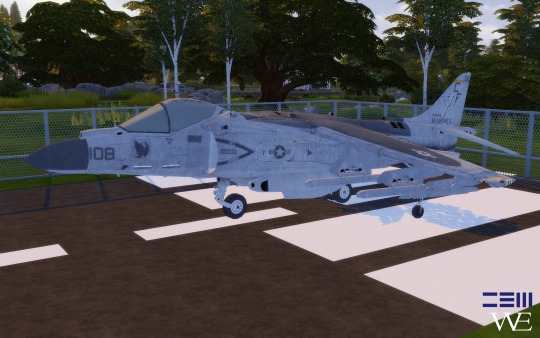
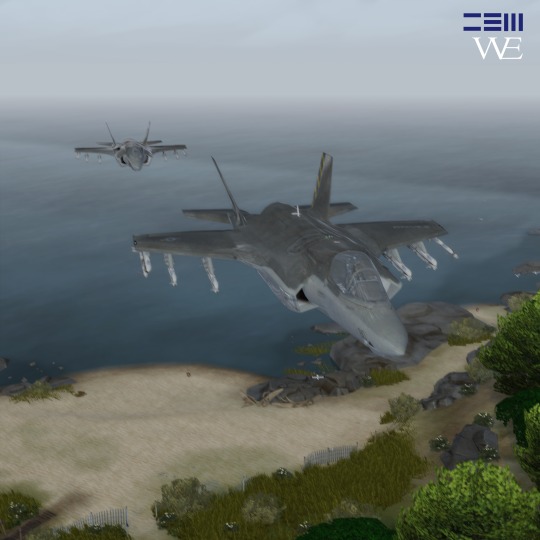
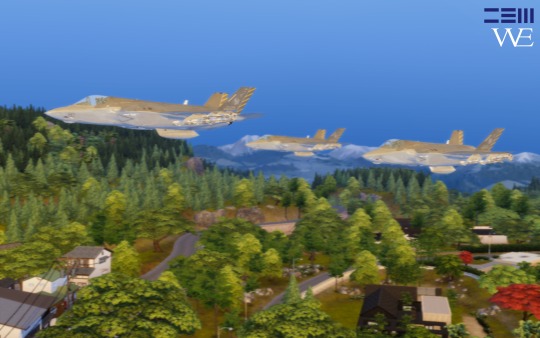

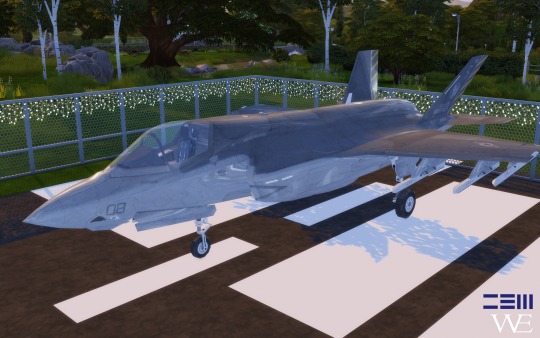
STOVL Fighters Collection
DOWNLOAD
At the end of 1950s, the engineers had just an idea of delivering the aircraft even without a runway. Then in the beginning of 1960s, some tests conducted to test the capability of STOVL (Short Take-Off Vertical Landing) or in other word, a possibility of vertical movement of the fixed-wing aircraft, began with the "Flying bunk" in1959. Then the Hawker Siddeley Limited in Britain proposed a concept named "P1127 Kestrel" as a prototype of the VTOL fighter. Then this concept acepted and in 1969, the production of Harrier GR1 had begun. This aircraft was intended to be in use for Royal Air Force, but the Royal Navy also got their own version of FRS1 years later. These Harriers sought it's first battle experience in Falklands War in 1982 when these Harriers brought down some of the Argentine's air capability without any losses. The last of the Harrier production was in GR9 variant which subsequently substituted by the latest F-35B by the Royal Air Force.
McDonnell-Douglas AV-8B Harrier II
The USMC was also seeking the aircraft that suits for the amphibious mission. After the success of the Harrier FRS1 and GR3 variants in the Falklands War, in 1985 the USMC proposed an inquiry to acquire some of these aircrafts, with also stated that these aircrafts should be manufactured in the United States. Then BAe Industries licensed the Harrier to the McDonnell-Douglas company . Also this aircraft met the service within the Royal Spanish Navy in 1987. Several missions has been done by AV-8Bs including Gulf War, Operation Enduring Freedom, Operation Iraqi Freedom and Libyan Crisis.
Lockheed Martin F-35B
The STOVL variant of F-35 Thunderbolt which it's STOVL technology derived from Yak-141 VTOL system, which sold to the Lockheed Martin in 1992, which emphasizes the vector exhaust and a fan in the middle of the aircraft. Also the most wanted aircraft in action of this century. The F-35B is the short take-off and vertical landing (STOVL) variant of the aircraft. Similar in size to the A variant, the B sacrifices about a third of the A variant's fuel volume to accommodate the SDLF. This variant is limited to 7 g. Unlike other variants, the F-35B has no landing hook. The "STOVL/HOOK" control instead engages conversion between normal and vertical flight.The F-35B is capable of Mach 1.6 (1,976 km/h) and can perform vertical and/or short take-off and landing (V/STOL)
#the sims 4#the sims#the sims 4 custom content#ts4 cc#ts4military#the sims 4 military#ts4#the sims 4 cc#ts4cc#deus ex machina#the sims 4 decades challenge#ts4 decades challenge#sims 4 decades#early 2000s#late 2000s#2000s style#fighter jet#f 35 lightning ii#british#american
27 notes
·
View notes
Text

🤔 … this is who this creature is!! He has to be stopped!! — sound familiar?
By: LaillaB, founder ‘Reclaim thre Narrative’, from LinkedIn …
“During his visit to Uganda in 2016 to commemorate the 40th anniversary of the Entebbe Operation, Netanyahu had a meeting with the leaders of Ethiopia, Kenya, Rwanda, South Sudan, Tanzania, and Zambia. This event took place as Netanyahu paid tribute to the memory of his brother, who lost his life during the release operation.
"Israel has fought terrorism and has developed certain capacities which I think are important for the defense of the world against this global onslaught of terrorism," Netanyahu said.
Speaking about mutual cooperation, the prime minister said "We are eager to share this technology in so many fields with our African friends. We think that Israel now is the best partner that the countries of Africa could have, and it's something that is dear to our hearts."
Netanyahu reiterated the words of Theodore Herzl, the founder of modern Zionism,
‘After I liberate the Jewish people, I will go to Africa to help liberate the black people.'
The original Herzl's quote is in his 1902 novel "Altneuland" ("Old-New Land").
It reads:
✍🏻 ‘There is still one other question arising out of the disaster of nations which remains unsolved to this day, and whose profound tragedy, only a Jew can comprehend.
This is the African question.
Just call to mind all those terrible episodes of the slave trade, of human beings who, merely because they were black, were stolen like cattle, taken prisoner, captured and sold.
Their children grew up in strange lands, the objects of contempt and hostility because their complexions were different.
I am not ashamed to say, though I may expose myself to ridicule for saying so, that once I have witnessed the redemption of the Jews, my people, I wish also to assist in the redemption of the Africas’
The Israeli PM also added during his speech;
“We have our African brethren, the Ethiopian Jews, who are in our society, and I personally work every few weeks to help integrate more and more and incorporate in our society."
🗞️ ‘Separate, but not equal treatment plagues Israel’s Ethiopian Jews’
👉🏼https://lnkd.in/edGPraUU
The African Union’s rejection to Israeli observer status was led by then Libyan leader Muammar Ghaddafi.
South Africa currently leads the charge against granting Israel observer status.
Gaining observer status would help enhance Israel's legitimacy on the continent as well as open doors for bi-lateral cooperation between Israel and other African countries.
With South Africa's landmark action at the ICJ against Israel, it seems highly unlikely that Israel will ever be able to secure observer status at the Organisation of AFRICAN Unity.
🇿🇦♥️ #HandsOffAfrica
“Injustice anywhere is a threat to justice everywhere” … MLK 🕊
#reclaimthenarrative — 🍉 — #FreePalestine …
@hrexach
#dr rex equality news information education#graphic source#graphic#graphics#hortyrex ©#horty#quote#it is what it is#war#palestine#Africa#palestinian liberation#mlk
3 notes
·
View notes
Note
Without lionizing Gaddafi (who by all accounts was a real piece of work), how well would you say the western intervention in Libya generally? Not having studied in closely, it seems to be a disaster twice over. First, because it destabilized North Africa specifically and the Mediterranean more generally, and second it sent every strong man in the world a clear message: "Do not give up your nukes. The nukes are all that prevents them from doing you the same way."
I don't think criticizing foreign action, whether specific mistakes or in general, is lionizing Gaddafi. I think that's a binary thought process - either you're pro-foreign intervention or pro-Gaddafi, where there's actually a whole gulf of possibilities not in either camp. This isn't a new problem, though, straw manning is an old rhetorical device, and it's not going away any time soon.
I disagree that the message "Do not give up your nukes. The nukes are all that prevents them from doing you the same way," was communicated by this though. Countries that have desired nuclear programs (Iran, North Korea) have sought to develop them regardless of Libya nuclear dismantlement - Iran's program was ongoing when Libya agreed to dismantle them in 2003, same with North Korea. Arguably, Cold War deterrence theory has already established that message. Similarly, plenty of non-nuclear equipped strongmen and kleptocrats have maintained their brutal stranglehold on their countries without the aid of nuclear weapons, usually through seeking a foreign military patron, selling a valuable resource (often extracted under near-slave working conditions), or just not being worth the hassle. Also, nuclear weapons are notoriously difficult to use, particularly for a small country, and they're a one-shot pistol. A country with a tiny nuclear weapons program can't be guaranteed of successful employment, cannot be guaranteed of secrecy, etc.
It's not an easy question for serious examination, not just because of politically-charged nature of the question but because "Western intervention" in terms of the NATO mission ended in 2011 and the Second Libyan Civil War erupted into violence in 2014. So in that sense, what is attributable to the power vacuum left by Gaddafi's death and what was not. A large-scale uprising against Gaddafi was almost inevitable given the context of the Arab Spring and reprisal against Gaddafi's repressive regime. The protests weren't sparked by foreign intervention (despite Gaddafi's claims and frequently-online claims of "CIA color revolutions" that always crop up), and Gaddafi was certainly killing a lot of protestors when intervention was authorized. In the narrow mission scope of preventing Gaddafi from murdering his own civilians, that's successful, but that's a bit like saying the War in Afghanistan was successful when Hamid Karzai was installed: the aftermath matters, especially to the civilians that live there. The GNC was unable to address Libyan civilian concerns and factional fighting (supported by various factions including Russia, Turkey, Egypt, etc.) erupted again. If we measure the western intervention's success against its mission goal of "prevent a humanitarian catastrophe," then it succeeded in the short-term only, and helped create the conditions for a humanitarian catastrophe. In that sense, it can't be seen as a success.
Thanks for the question, Anon.
SomethingLikeALawyer, Hand of the King
15 notes
·
View notes
Text
Here is why I don't want to see the "live-action" Little Mermaid: because it looks like 90%cgi which means it is basically animated. A perfectly great animated version already exists. I do not want to see a weird looking almost pure cgi-created remake. Lots of books and stories exist that have not been made into movies or TV series. Turning them into screenplays is not much more work than re-doing the same old stories with new actors or more cgi or actors who aren't cis-white-heterosexuals, tell them to us and don't make Fast and Furious 13 or the live action Inside Out. Also don't do exclusivity by making a "documentary" where Cleopatra, a Greek woman who was the product of a 300 year incestuous dynasty of Greeks is presented as a black African. She was not even Egyptian, whatever that ethnically meant in 30 b.c.e., probably mostly some mixture of North African, Persian, Nubian, Libyan, and Greek ancestry? Also more projects should include POC and LGBTQIA people but when every project MUST include them that is not inclusion but more like tokenism? More like a different weird way to mark them as OTHER rather than accepting as US and SAME and EQUAL. Guess I am just ranting at the entertainment industry in general?
4 notes
·
View notes
Text
Libya's Tripoli government signed a preliminary deal on energy exploration on Monday, prompting Greece and Egypt to say they would oppose any activity in disputed areas of the eastern Mediterranean.
Libya's eastern-based parliament, which backs an alternative administration, also rejected the deal.
Speaking at a ceremony in Tripoli, Turkish Foreign Minister Mevlut Cavusoglu and Libyan Foreign Minister Najla Mangoush said the deal was one of several in a memorandum of understanding on economic issues aimed at benefiting both countries.
It was not immediately clear whether any concrete projects to emerge would include exploration in the "exclusive economic zone" which Turkey and a previous Tripoli government agreed in 2019, angering other eastern Mediterranean states.
That zone envisaged the two countries sharing a maritime border but was attacked by Greece and Cyprus and criticised by Egypt and Israel.
"It does not matter what they think," said Cavusoglu when asked if other countries might object to the new memorandum of understanding.
"Third countries do not have the right to interfere," he added.
Greece's foreign ministry said on Monday that Greece had sovereign rights in the area which it intended to defend "with all legal means, in full respect of the international law of the sea."
It cited a 2020 pact between Athens and Egypt, designating their own exclusive economic zone in the eastern Mediterranean, which Greek diplomats have said effectively nullified the 2019 accord between Turkey and Libya.
"Any mention or action enforcing the said 'memorandum' will be de facto illegitimate and depending on its weight, there will be a reaction at a bilateral level and in the European Union and NATO," the Greek foreign ministry said in a statement.
An Egyptian foreign ministry's statement said on Monday that Foreign Minister Sameh Shoukry received a phone call from his Greek counterpart, Nikos Dendias, where they discussed the developments in Libya.
They both stressed that "the outgoing 'government of unity' in Tripoli does not have the authority to conclude any international agreements or memoranda of understanding,"the Egyptian foreign ministry's statement added.
3 Oct 22
10 notes
·
View notes
Text
13 Hours was a movie I only watched because I read the book, and the book was frankly better.
Part of this comes from the lack of nuance in the movie. The book delivered a brief but informative background for the motivation behind the Libyan conflict that led to the murder of the ambassador and attack on the US Annex in Libya, the movie did little to explain it other than “Gadaffi gone = unrest, see also: Somalia.”
The movie definitely tried to drop into the shoes of films like American Sniper where you ignore the larger scope of the conflict and stay glued to the personal development of the characters, but unlike American Sniper, it failed to attempt artistic elevation, instead choosing sensationalist Michael Bay action. Which makes sense because it was directed by Micheal Bay himself.
The Bayhem is what really made it unenjoyable for me. Not that I dislike guns-blazing action at all, but having read the book first the action star treatment felt overdone and tacky considering that Benghazi was a tragedy stemming from poor government leadership and dismal security protocols that allowed for the murder of a US Ambassador who was actively trying to help the country recover. What part of that situation calls for lensflare and overblown tough guy performances? There are ways to make an action focused film that respectfully commemorates those who lost their lives heroically, but this just felt tone-deaf about it.
I recall on the films release hearing someone mention how the movie was a moving portrayal of the attack and how everyone who watched it would condemn the US government for throwing the entire Benghazi delegation under the bus and laud the heroism of the handful of private military guys who stepped up to do what the Government wouldn’t and save American lives. I don’t disagree with the sentiment (Benghazi itself was a clearly preventable trainwreck) but this movie is not what would wake me up to that. The only way I’d look at this movie and question anything would be if the film made me read the book.
Nowhere in the film did it question why six mercenaries were the best hope for the Ambassador’s security, nor did it ask why the mercenaries were there in the first place. It didn’t even think to ask why the attackers were attacking, and its only condemnation of state dept. waffling was solidly placed on the shoulders of the CIA handler and didn’t even begin to question why things were so bungled higher up the chain. For a “condemnation” it seemed happy enough just showing bearded muscle men shooting scary looking foreigners and then crying when their guys got killed. Considering the comprehensive account of the debacle in the book, the whole movie feels empty.
Speaking of social impact, this movie was released in 2016, and calculatedly omits any mention of Hillary Clinton’s name in any part of the script, despite her involvement in the administrative decisions that resulted in the deaths of American citizens under her watch. I completely agree with the choice to shy away from making explicitly political art on an election year (always feels like a hack job) but I also think Bay’s a coward for not committing to the bit and going all the way. He was going to release it in 2016 anyway, why not take it one step further and do something REALLY funny? Instead we got an annoying military movie that wasn’t even about enlisted soldiers.
In the end, the movie isn’t even remarkable enough to impact an election and the biggest contribution it has to society is making people more aware that Mercenary “Operators” and special ops units are allowed to wear cool beards into combat. It’s a forgettable action flick that plays too loose and sensationalist with real world events to make me care.
The worst part of the entire film was the Mercedes Benz sponsorship that found them replacing all the interesting BMWs and Toyota Land Cruisers with shiny looking Mercedes sedans. I want my interesting cars gosh darn it! A single Land Rover Defender in the beginning doesn’t make it any better, and I feel robbed. Go read the book, the movie isn’t worth it.
2 notes
·
View notes
Text
Events 2.21
452 or 453 – Severianus, Bishop of Scythopolis, is martyred in Palestine.
1245 – Thomas, the first known Bishop of Finland, is granted resignation after confessing to torture and forgery.
1440 – The Prussian Confederation is formed.
1613 – Mikhail I is unanimously elected Tsar by a national assembly, beginning the Romanov dynasty of Imperial Russia.
1797 – A force of 1,400 French soldiers invaded Britain at Fishguard in support of the Society of United Irishmen. They were defeated by 500 British reservists.
1804 – The first self-propelling steam locomotive makes its outing at the Pen-y-Darren Ironworks in Wales.
1808 – Without a previous declaration of war, Russian troops cross the border to Sweden at Abborfors in eastern Finland, thus beginning the Finnish War, in which Sweden will lose the eastern half of the country (i.e. Finland) to Russia.
1828 – Initial issue of the Cherokee Phoenix is the first periodical to use the Cherokee syllabary invented by Sequoyah.
1842 – John Greenough is granted the first U.S. patent for the sewing machine.
1848 – Karl Marx and Friedrich Engels publish The Communist Manifesto.
1862 – American Civil War: Battle of Valverde is fought near Fort Craig in New Mexico Territory.
1866 – Lucy Hobbs Taylor becomes the first American woman to graduate from dental school.
1874 – The Oakland Daily Tribune publishes its first edition.
1878 – The first telephone directory is issued in New Haven, Connecticut.
1885 – The newly completed Washington Monument is dedicated.
1896 – An Englishman raised in Australia, Bob Fitzsimmons, fought an Irishman, Peter Maher, in an American promoted event which technically took place in Mexico, winning the 1896 World Heavyweight Championship in boxing.
1913 – Ioannina is incorporated into the Greek state after the Balkan Wars.
1916 – World War I: In France, the Battle of Verdun begins.
1918 – The last Carolina parakeet dies in captivity at the Cincinnati Zoo.
1919 – German socialist Kurt Eisner is assassinated. His death results in the establishment of the Bavarian Soviet Republic and parliament and government fleeing Munich, Germany.
1921 – Constituent Assembly of the Democratic Republic of Georgia adopts the country's first constitution.
1921 – Rezā Shāh takes control of Tehran during a successful coup.
1925 – The New Yorker publishes its first issue.
1929 – In the first battle of the Warlord Rebellion in northeastern Shandong against the Nationalist government of China, a 24,000-strong rebel force led by Zhang Zongchang was defeated at Zhifu by 7,000 NRA troops.
1934 – Augusto Sandino is executed.
1937 – The League of Nations bans foreign national "volunteers" in the Spanish Civil War.
1945 – World War II: During the Battle of Iwo Jima, Japanese kamikaze planes sink the escort carrier USS Bismarck Sea and damage the USS Saratoga.
1945 – World War II: the Brazilian Expeditionary Force defeat the German forces in the Battle of Monte Castello on the Italian front.
1947 – In New York City, Edwin Land demonstrates the first "instant camera", the Polaroid Land Camera, to a meeting of the Optical Society of America.
1948 – NASCAR is incorporated.
1952 – The British government, under Winston Churchill, abolishes identity cards in the UK to "set the people free".
1952 – The Bengali Language Movement protests occur at the University of Dhaka in East Pakistan (now Bangladesh).
1958 – The CND symbol, aka peace symbol, commissioned by the Direct Action Committee in protest against the Atomic Weapons Research Establishment, is designed and completed by Gerald Holtom.
1965 – Malcolm X is gunned down while giving a speech at the Audubon Ballroom in Harlem.
1971 – The Convention on Psychotropic Substances is signed at Vienna.
1972 – United States President Richard Nixon visits China to normalize Sino-American relations.
1972 – The Soviet unmanned spaceship Luna 20 lands on the Moon.
1973 – Over the Sinai Desert, Israeli fighter aircraft shoot down Libyan Arab Airlines Flight 114 jet killing 108 people.
1974 – The last Israeli soldiers leave the west bank of the Suez Canal pursuant to a truce with Egypt.
1975 – Watergate scandal: Former United States Attorney General John N. Mitchell and former White House aides H. R. Haldeman and John Ehrlichman are sentenced to prison.
1994 – Aldrich Ames is arrested by the Federal Bureau of Investigation for selling national secrets to the Soviet Union in Arlington County, Virginia.
1995 – Steve Fossett lands in Leader, Saskatchewan, Canada becoming the first person to make a solo flight across the Pacific Ocean in a balloon.
2013 – At least 17 people are killed and 119 injured following several bombings in the Indian city of Hyderabad.
2022 – In the Russo-Ukrainian crisis Russian President Vladimir Putin declares the Luhansk People's Republic and Donetsk People's Republic as independent from Ukraine, and moves troops into the region. The action is condemned by the United Nations.
2 notes
·
View notes
Photo

Romans versus “Barbarians”: A Military Comparison, Part Two
An Original Essay of Lucas Del Rio
Note: This is the second installment of an essay that will be four parts in total. The previous installment has already been posted on my blog. Each section chronologically covers the wars fought by the Romans in the events leading up to the dawn of the Middle Ages. A special focus is on how both the Romans and their adversaries, whom the former referred to the latter as “barbarians,” fought in terms of tactics and weaponry. In this segment of the essay, the focus will be on the Roman wars with the Carthaginians, Iberians, Macedonians, and Seleucids.
The Roman Republic was in a strong position once it had secured control over all of Italy. However, it was not yet at this point the dominant power in the Mediterranean, or even in the western Mediterranean. For several centuries prior to the Roman unification of Italy, the title of being the greatest Mediterranean realm had belonged to Carthage. Located in modern Tunisia, the city of Carthage was initially founded by Phoenicians. A culture that emerged in the Bronze Age, the Phoenicians were Canaanites in the Levant who spoke a Semitic language. Their early history is poorly documented, but at their peak, they were expert sailors and traders. Some Phoenicians traveled as far as the Atlantic. Folklore states that a Phoenician queen, whose name has been disputed, founded Carthage in 814 BC. If this is true, the city was founded sixty-one years before the Romans claimed that their own city was established. Some historians believe that the conquest of the Levant in 538 BC by Persian King Cyrus the Great caused many Phoenicians to settle elsewhere, including in Carthage.
Cyrus the Great was not the only conqueror whose actions led to an increase in the strength of Carthage while their ancestral homeland of Phoenicia declined. Later, in 332 BC, Alexander the Great seized the region from the Persians. Alexander ravaged Phoenicia, and those that were able to flee did so. In the years that followed, Carthage established vast trade routes, allowing it to grow and prosper as it sold dye, glass, and ivory throughout the Mediterranean. The Carthaginians had formed an empire by the 600s BC with colonies across North Africa. These endeavors led them to build a feared and formidable navy. They also developed a military, learning to vigorously utilize javelin throwing cavalry from their allies, the neighboring Numidians. Like many empires at the time, the Carthaginians employed chariots early on and would increasingly copy Greek and Macedonian phalanxes. During this point in history, there were still elephants in North Africa, and they trained these elephants for battle. Carthaginian war elephants were armored, had their tusks outfitted with sharp objects, and usually carried two soldiers.
The Carthaginian army included native Carthaginians, who occupied all leadership roles. However, the bulk of its forces were foreign mercenaries. These included Balearic slingers, both Celtic and Iberian swordsmen, Cretan archers, and Libyan warriors who fought with axes. Eventually, these soldiers would end up fighting the Romans, although the two cultures had not always been enemies. In fact, prior to the Punic Wars, their societies had been close trade partners who were generally on positive terms. At the time that the Romans had largely secured control of mainland Italy, the nearby island of Sicily was almost entirely Carthaginian territory. This may have allowed both empires to do business with one another, but the close proximity of the island and the peninsula began to spark tensions. Pyrrhus had remarked after his defeat in Italy by the Romans that war between Carthage and Rome war was inevitable.
The Punic Wars would not be the first time that Carthage had experienced a major military confrontation. Prior to the Punic Wars, the Carthaginians had to fight a Greek general named Agathocles. A former mercenary, it was actually with their help that Agathocles was able to establish his own military dictatorship. In 317 BC, he seized power in Syracuse, a colony of the Greek city-state of Corinth and the only major city on the island of Sicily other than Acragas not controlled by the Carthaginian Empire. Still not content, Agathocles invaded other cities on the island. While the Carthaginians managed to repel these attacks, Agathocles was able to escape with sixty ships before Syracuse could be captured. By doing so, he managed to bring fourteen thousand soldiers to Africa. At this time, Carthage was battling an uprising, plus its soldiers in Sicily were struggling to take Syracuse despite the absence of its leader. Agathocles was making impressive progress in conquering cities belonging to Carthage, but he went back to defend Syracuse once he realized his city was beginning to fall. He was forced to sign a peace treaty with the Carthaginians in 306 BC and agreed to give them their cities back, although he continued to conduct military campaigns elsewhere for the duration of his life.
Like the war that the Carthaginians were forced to fight against Agathocles, the starting battleground of the First Punic War would be in Sicily. It began as a proxy war, as the Romans became involved in a power struggle on the island concerning Carthage. Mercenaries known as the Mamertines previously had employment with the monarchy in Syracuse. After their work for the city had concluded, they chose to seize control of a different city known as Messina. In an attempt to avoid facing the wrath of Carthage, the Mamertines went to the Roman Senate to seek an alliance. Even though Carthage and Rome had not previously been adversaries, the Romans now saw an opportunity to expand into Sicily and in 264 BC sent soldiers. Before long, the two empires had entered a state of open warfare. Both sides knew the strengths of their opponent and thus tried to keep the combat that they excelled at. Carthage had the advantage of a highly formidable navy, whereas serious naval warfare was something that the Romans had never previously experienced. On the other hand, the Carthaginians, with their dependence on foreign mercenaries, lacked a land formation of their own that could compete with Roman warriors, who fought in legions.
The Carthaginian advantage at sea would not last long against the industrious Romans. Ships captured by the Romans were examined by Roman engineers, who learned how they could build their own. Unlike the Carthaginians, who sunk enemy ships with rams attached to their own, the Romans employed the tactic of boarding the Carthaginian ships with legionnaires. As the war went on, the Romans won battle after battle despite the brave efforts of Hamilcar Barca, a commander who is still celebrated in the field of military history. Because the situation in Sicily remained a stalemate, the Roman army invaded Africa directly in 256 BC. Carthage sought the help of a Spartan military commander by the name of Xanthippus, who helped repel the Roman onslaught, yet it was still not enough for Carthage to win the war. In 241 BC, the Carthaginians surrendered and were forced to give up Sicily, plus give the Romans tribute. However, despite this surrender, the Carthaginian Empire retained its sovereignty, as it had not yet been defeated.
Much of what happened in the years following the First Punic War were not kind to Carthage. As Sicily had been one of its most important trade destinations, funds were lacking to pay the mercenaries that composed much of the Carthaginian army. Between 240 and 237 BC, a conflict occurred known as “the Mercenary War” in which many of their mercenaries revolted. While Carthage managed to defeat the rebels, the Romans took advantage of the situation to seize Corsica and Sardinia, two other major islands in the Mediterranean. The sea had become dominated by the Romans, who were now an unmatched naval power. However, the Carthaginians were still trying to reestablish themselves as a major power. They decided to colonize the Iberian Peninsula, where they founded various settlements, including the city of Cartagena in 228 BC that still stands today. Hamilcar Barca, the aforementioned general, played an active role in Carthaginian military operations in Iberia. His son, Hannibal, and his son-in-law, Hasdrubal, followed in his footsteps.
Peace between the two cultures would not last. Hamilcar died in 228 BC, but both Hannibal and Hasdrubal would continue fighting for the empire they served. Silver mines captured in Iberia eased the strain on the Carthaginian economy that had been caused by the tribute owed to the Romans. The silver also allowed for the military to expand again. With Carthage resurgent, the empire would soon strike back. Rome, having recently defeated Celtic allies of Carthage to the north of Italy, were not worried about the possibility of another war. Hannibal led an army to seize a town in Iberia called Saguntum in 219 BC, which startled the Romans, as the Saguntines were their ally. However, while the move provoked Rome, nothing about this particular action by the Carthaginians was in violation of any diplomatic treaty between the two societies. If anything, the Romans had acted illegally by allying with these people, as the town was in a location that both sides agreed was to be reserved for the Carthaginians. Rome demanded that Carthage extradite Hannibal, which they did not. It was the start of the Second Punic War in 218 BC, in which the Romans would see plenty more of Hannibal.
Hannibal first gathered an army in Iberia, which included many Iberian mercenaries. Prior to his death, Hamilcar had been trying to build a more effective army for Carthage after the defeat in the First Punic War had largely been the result of a weak one. Due to the strong presence that the Carthaginians now had on the Iberian Peninsula, recruiting the locals for the new war would have been a logical choice. Most obviously, the region was fairly close to Italy, which Hannibal intended to invade. Additionally, the Iberians were fierce warriors who had mastered fighting as both infantry and cavalry. Like their Roman counterparts, Iberian infantry carried large shields, were heavily armored, and threw javelins at their enemies before charging. By the time of the Second Punic War, it had become clear that Roman legionnaires were some of the best melee infantry in the known world. However, the Iberians had some advantages in melee combat. Legionnaires were still generally armed with spears, and those that fought with swords still carried a now outdated variety long used in Greece. Years later, legionnaires started to be equipped with a type of sword that they called the “gladius hispanicus,” a weapon, based on the Iberian “falcata,” that would also famously become common in brawls between gladiators.
As previously stated, the Iberians were also very skilled at fighting on horseback. Like the Spanish cavalry that would later exist in the region many centuries later, the Iberians had a combination of both heavy and light cavalry. Whereas the heavy cavalry wielded both lances and their signature swords, the light cavalry threw javelins. Hannibal, of course, had a variety of soldiers in the army that he amassed to invade Italy, with ninety thousand infantry and twelve thousand cavalry. He also mustered forty war elephants. Carthaginian war elephants had previously been of the variety indigenous to North Africa, but it has been theorized that Hannibal acquired Asian elephants for his campaign against Rome. If this is true, the elephants were likely supplied by the Ptolemies, the dynasty that then ruled Egypt. The Ptolemies were on friendly terms with Carthage and had trade routes with the east.
The Second Punic War was arguably the greatest threat to Rome for centuries to come. Hannibal knew that he could not give Rome the chance to invade Africa, as it had done to win in the First Punic War. He therefore decided that his first move would be to march his troops directly from Iberia to Italy. In doing so, the army commanded by Hannibal had to cross over the Alps, which resulted in twenty thousand soldiers dying. It was probably especially disappointing to Hannibal that only one elephant survived the journey. However, this did not stop him. Rome expected his weakened army to be defeated quickly, but Hannibal proved to be a tactical genius and won countless battles. His army wandered and ravaged Italy until 203 BC. Like Pyrrhus years earlier, the main reason for his defeat was his inability to replenish fallen troops after major battles. Carthage did little to provide support to Hannibal, and he failed to find many allies among conquered Italians that he expected would want an opportunity to revolt.
Rome would defeat Carthage in a similar manner that they won the first time. After Hasdrubal failed in an attempt to reinforce Hannibal, the Romans invaded Iberia and then Africa, conquering all of the Carthaginian Empire except for its capital city. Hannibal had arrived with his army, but it was too late. In 202 BC, Carthage was forced to agree to another humiliating peace treaty. From 149 to 146 BC, there would be a Third Punic War, which occurred when Rome was making various rather absurd demands. Perhaps the most bizarre of these was that the Romans wanted the Carthaginians to abandon their city and found a new one further away from the sea. Carthage had also declared war on the Numidians, which the Carthaginians were forbidden to do according to the prior peace treaty. This time, Carthage was very weak, and the Romans chose to raze the city once and for all.
During the lengthy span of time that the Roman Republic waged war against Carthage and its colonies, the world of classical antiquity saw other violent conflicts elsewhere. Several dynasties with roots in wars that had occurred decades before the Romans united Italy would be among the next barriers to Roman expansion. The story of these dynasties begins with Alexander the Great, the Macedonian conqueror who defeated the entirety of the Persian Empires. His death in 323 BC without an heir left the mighty realm that he had built without anyone to succeed him. Decades of violence they called “the Wars of the Diadochi” followed, with several former generals of Alexander carving out pieces of his domain. Even his homeland of Macedon was not spared. Macedon and its new line of rulers became known as “the Antigonid Dynasty,” even though Antigonus was killed in one of the wars. Philip V, who was one such ruler, went to war with the Romans in 215 BC in hopes that he could help Carthage contain the rising power of Rome.
Ten years after the start of the first of the Macedonian Wars, Rome made peace with Macedon. Unlike the Carthaginians, who had lost territory fighting the Romans, Philip V was able to gain some. However, further warfare between Macedon and Rome would favor the latter. The Macedonians began to militarily annex various Greek city-states in violation of the peace treaty, prompting a declaration of war by Rome in 200 BC. Rome brought elephants, which along with Roman legions, the Macedonian phalanxes were helpless against. By 196 BC, Rome had won, and the Romans assumed control of most of Greece. An additional two wars also ended in Macedonian defeats, with the ultimate result being full Roman control of the region. Another, more powerful successor state to the realm of Alexander the Great, known as “the Seleucid Dynasty,” also fell victim to Rome and its legions.
#ancient#ancient rome#ancient warfare#antiquity#civilization#classical antiquity#classical era#classical warfare#essay#history#legion#military history#punic wars#roman republic#rome#society#tactics#war#warfare#warriors
4 notes
·
View notes
Text
BBC 0435 23 Apr 2024
12095Khz 0358 23 APR 2024 - BBC (UNITED KINGDOM) in ENGLISH from TALATA VOLONONDRY. SINPO = 55445. English, dead carrier s/on @0358z with ID@0359z pips and Newsday preview. @0401z World News anchored by Fiona Macdonald. Rishi Sunak's flagship Rwanda bill is finally set to become law after months of wrangling ended in a parliamentary showdown shortly before midnight. It designates Rwanda a safe country and is a key part of the government's plans to send some asylum seekers there. The bill has been fiercely criticised by opposition parties but the Lords ended their objections late on Monday. The top UN envoy for Haiti on Monday stressed the need for improved security in the country to allow for further political progress. In her briefing to the Security Council, Maria Isabel Salvador, the UN secretary-general's special representative for Haiti, welcomed the recent political progress in Haiti, especially the establishment of the Transitional Presidential Council (TPC). A hush-money payment was "election fraud, pure and simple", the prosecution alleges in Donald Trump's historic New York trial. But the former president's lawyer says his client did not commit any crimes, adding "he is cloaked in innocence". Trump is accused of trying to cover up a $130,000 (£104,500) payment to porn star Stormy Daniels before he won the 2016 election. A father has started legal action against UK oil giant BP over the death of his 21-year-old son. Hussein Julood alleges the burning off of gas at a BP-run oil field in Iraq, a practise known as flaring, caused his son Ali's leukaemia. A BBC investigation in 2022 found Ali's village, which lies within the field, had high levels of cancer-causing pollutants known to come from flaring. First responders were battling several wildfires in western Canada Monday, in an area facing extreme drought which last year saw its worst-ever fire season. After a long legal battle in Peru for the right of an assisted death, Ana Estrada said she now feels free to avoid suffering from an incurable and debilitating illness that has plagued her for three decades. The Peruvian Supreme Court this week confirmed a prior ruling that allows Estrada, a 44-year-old psychologist, to end her life after a five-year legal battle and years of illness. Federal police in Brazil arrest several 1st Capital Bank executives on money laundering charges. Tunisia held a "first advisory meeting" Monday in its capital Tunis with Algerian and Libyan leaders in the hope of establishing a new Maghreb regional coalition. No leaders from Morocco or Mauritania were present at the meeting, set to take place every three months. The coalition is aimed at furthering "security, stability and development throughout the region", Tunisian foreign minister Nabil Ammar read from a statement. @0406z "Newsday" begins. 250ft unterminated BoG antenna pointed E/W w/MFJ-1020C active antenna (used as a preamplifier/preselector), Etón e1XM. 250kW, beamAz 315°, bearing 63° . Received at Plymouth, MN, United States, 15359KM from transmitter at Talata Volonondry. Local time: 2258.
0 notes
Text
Mossad Whistleblower Victor Ostrovsky on Israeli Black Operations!

Top Quotes:
“The entire Jewish lobby in the United States was mobilized.”
“The ADL tarnished as anti-Semitic whomever they couldn’t sway to the Israeli cause.”
“We have in this way recruited over eighty Palestinians this past year.”
“Using the Trojan, the Mossad tried to make it appear that a long series of terrorist orders were being transmitted to various Libyan embassies around the world.”
“The Mossad realized that it had to come up with a new threat to the region, a threat of such magnitude that it would justify whatever action the Mossad might see fit to take.”
“Supporting the radical elements of Muslim fundamentalism sat well with the Mossad’s general plan for the region. () And if the Mossad could arrange for Hamas to take over the Palestinian streets from the PLO, then the picture would be complete.”
“The ties between (British media mogul) Robert Maxwell and the Mossad went back a long way.”
“The American invasion of Panama dried up the Mossad’s income from drug trafficking.”
“Operation Hannibal was in itself an arms deal between Israel and Iran, using the German intelligence agency as a cut-out for the operation.”
“The manpower for the operation was supplied by a Mossad Italian ally, a man named Licio Gelli and his group Propaganda Due, and a second group named Gladio.”
“These seminars that the Mossad was holding in the friendly environment of the country club were in fact well-oiled recruiting operations that had brought into the Mossad’s bank of manpower hundreds if not thousands of Western law enforcement personnel.”
“He wasn’t really ‘bought,’ as they liked their politicians to be.”
“This had all the dirty elements that are so typical of Mossad activity in a friendly country.”
“By the time the wine arrived in Barschel’s room, it had already been spiked by a Kidon member.”
“The Mossad had direct links with the Jewish Defense League, the Anti-Defamation League of the B’nai Brith, the AIPAC, and the United Jewish Appeal.”
“After filling the kids with a large dose of militant Zionism, the Mossad sends them back as the spies of the future.”
“This was an all-out psychological warfare attack aimed at getting the United States involved militarily in the Middle East in general and the Gulf area in particular.”
“With all the security forces involved and the assassins dead, it would be very difficult to discover where the security breach had been.”
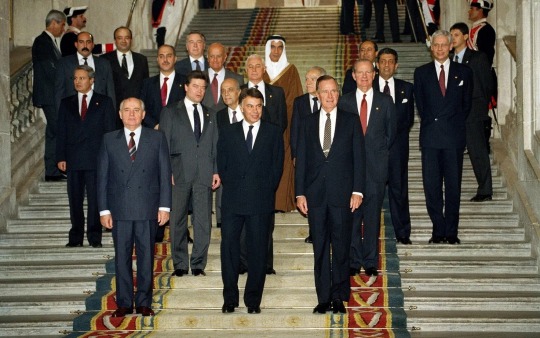
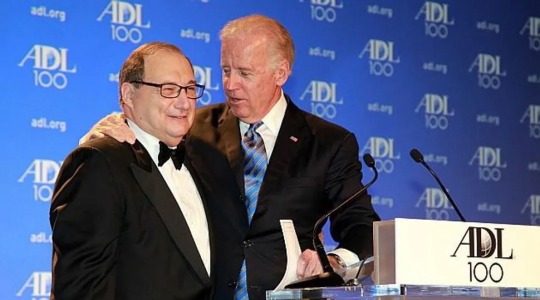

Israeli Military Intelligence Whistleblower Ari Ben-Menashe in 1992. Fairfax/Getty
0 notes